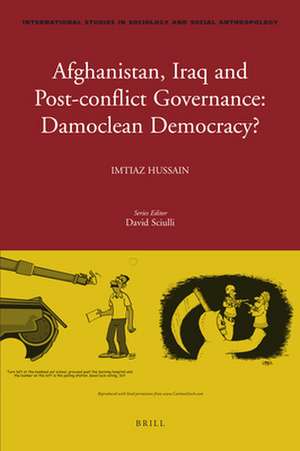Afghanistan, Iraq, and Post-conflict Governance: Damoclean Democracy?: International Studies in Sociology and Social Anthropology, cartea 113
Autor Imtiaz Hussainen Limba Engleză Hardback – 10 ian 2010
Din seria International Studies in Sociology and Social Anthropology
- 18%
 Preț: 833.13 lei
Preț: 833.13 lei - 18%
 Preț: 541.29 lei
Preț: 541.29 lei - 18%
 Preț: 545.34 lei
Preț: 545.34 lei - 18%
 Preț: 604.08 lei
Preț: 604.08 lei - 18%
 Preț: 611.54 lei
Preț: 611.54 lei - 18%
 Preț: 603.99 lei
Preț: 603.99 lei - 18%
 Preț: 602.35 lei
Preț: 602.35 lei - 18%
 Preț: 650.88 lei
Preț: 650.88 lei - 18%
 Preț: 584.07 lei
Preț: 584.07 lei - 18%
 Preț: 585.17 lei
Preț: 585.17 lei - 18%
 Preț: 721.86 lei
Preț: 721.86 lei - 18%
 Preț: 801.16 lei
Preț: 801.16 lei - 18%
 Preț: 611.97 lei
Preț: 611.97 lei - 18%
 Preț: 682.98 lei
Preț: 682.98 lei - 18%
 Preț: 611.81 lei
Preț: 611.81 lei - 18%
 Preț: 611.36 lei
Preț: 611.36 lei - 18%
 Preț: 682.98 lei
Preț: 682.98 lei - 18%
 Preț: 666.72 lei
Preț: 666.72 lei - 18%
 Preț: 661.51 lei
Preț: 661.51 lei - 18%
 Preț: 656.68 lei
Preț: 656.68 lei - 18%
 Preț: 598.06 lei
Preț: 598.06 lei - 18%
 Preț: 598.06 lei
Preț: 598.06 lei - 18%
 Preț: 844.69 lei
Preț: 844.69 lei - 18%
 Preț: 576.44 lei
Preț: 576.44 lei - 18%
 Preț: 635.49 lei
Preț: 635.49 lei - 18%
 Preț: 703.94 lei
Preț: 703.94 lei - 18%
 Preț: 631.60 lei
Preț: 631.60 lei -
 Preț: 318.99 lei
Preț: 318.99 lei -
 Preț: 312.96 lei
Preț: 312.96 lei -
 Preț: 293.00 lei
Preț: 293.00 lei -
 Preț: 222.16 lei
Preț: 222.16 lei -
 Preț: 282.82 lei
Preț: 282.82 lei -
 Preț: 282.82 lei
Preț: 282.82 lei -
 Preț: 355.16 lei
Preț: 355.16 lei -
 Preț: 282.82 lei
Preț: 282.82 lei -
 Preț: 282.82 lei
Preț: 282.82 lei -
 Preț: 318.99 lei
Preț: 318.99 lei -
 Preț: 349.99 lei
Preț: 349.99 lei
Preț: 614.16 lei
Preț vechi: 748.98 lei
-18% Nou
Puncte Express: 921
Preț estimativ în valută:
117.58€ • 122.68$ • 98.56£
117.58€ • 122.68$ • 98.56£
Carte indisponibilă temporar
Doresc să fiu notificat când acest titlu va fi disponibil:
Se trimite...
Preluare comenzi: 021 569.72.76
Specificații
ISBN-13: 9789004180338
ISBN-10: 9004180338
Pagini: 308
Dimensiuni: 160 x 240 x 23 mm
Greutate: 0.68 kg
Editura: Brill
Colecția Brill
Seria International Studies in Sociology and Social Anthropology
ISBN-10: 9004180338
Pagini: 308
Dimensiuni: 160 x 240 x 23 mm
Greutate: 0.68 kg
Editura: Brill
Colecția Brill
Seria International Studies in Sociology and Social Anthropology
Notă biografică
Imtiaz Hussain is Professor of International Relations in Mexico City’s Universidad Iberoamericana, with recent publications addressing regional integration, democratization, and homeland security. A recipient of several teaching and research awards, he received his Ph.D. from the University of Pennsylvania, and is from Bangladesh.
Cuprins
List of Illustrations
List of Abbreviations
Acknowledgements
1. Afghanistan & Iraq, Democracy & the United States: Between Rocks and Hard Places
Introduction: Of Puzzles, Problems, & Predicaments
Nature of the Subject
Formatting Interpretations
Signifi cance of Subject
Organization
2. Hyphenating Democracy: Germany, Japan, & the Confl ict Thesis
Argument
Theoretical Perspective
Democratizing the Defeated: German and Japanese
Experiences in Comparative Light
Conclusions
3. Embracing Democracy: Afghanistan, Iraq, & Prior U.S.
Considerations
Introduction
Negotiating Democracy
Conclusions
4. Blindfolding Democracy: Blueprinting Ballots From
Bullets
Introduction
Building a Blueprint
Actors and Actions
From Confl ict to Cooperation
Conclusions
5. Sine qua non democracy: Afghan-Iraq Symmetries &
C.P.A. as Oddball
Introduction
A Tale of Two Negotiating Tables
Conclusions
6. Ad Hoc Democracy: Troubled Waters Too Deep,
Bridges Too Few
Introduction
Afghanistan-Iraq Comparisons & Contrasts
Conclusions
7. Constitutional Democracy: Afghanistan’s Paper Tiger &
Iraq’s Pigeon Clay
Introduction
Profi ling Constitution-making
Future Prospects: Towards Functional Statehood
Conclusions
8. Electoral Democracy: Still the Road Less Traveled By
Introduction
Elections and Governmental Performances
Post-Election Issues and Contentions
Contexts and Verdicts
Conclusions
9. Conclusions: Damoclean Democracy?
A Triple-headed Monstrosity & Mine-fi lled Exits
Negotiations-Democratization Approach
Substantive Similarities and Differences
Theoretical Reprise
Bibliography
Index
List of Abbreviations
Acknowledgements
1. Afghanistan & Iraq, Democracy & the United States: Between Rocks and Hard Places
Introduction: Of Puzzles, Problems, & Predicaments
Nature of the Subject
Formatting Interpretations
Signifi cance of Subject
Organization
2. Hyphenating Democracy: Germany, Japan, & the Confl ict Thesis
Argument
Theoretical Perspective
Democratizing the Defeated: German and Japanese
Experiences in Comparative Light
Conclusions
3. Embracing Democracy: Afghanistan, Iraq, & Prior U.S.
Considerations
Introduction
Negotiating Democracy
Conclusions
4. Blindfolding Democracy: Blueprinting Ballots From
Bullets
Introduction
Building a Blueprint
Actors and Actions
From Confl ict to Cooperation
Conclusions
5. Sine qua non democracy: Afghan-Iraq Symmetries &
C.P.A. as Oddball
Introduction
A Tale of Two Negotiating Tables
Conclusions
6. Ad Hoc Democracy: Troubled Waters Too Deep,
Bridges Too Few
Introduction
Afghanistan-Iraq Comparisons & Contrasts
Conclusions
7. Constitutional Democracy: Afghanistan’s Paper Tiger &
Iraq’s Pigeon Clay
Introduction
Profi ling Constitution-making
Future Prospects: Towards Functional Statehood
Conclusions
8. Electoral Democracy: Still the Road Less Traveled By
Introduction
Elections and Governmental Performances
Post-Election Issues and Contentions
Contexts and Verdicts
Conclusions
9. Conclusions: Damoclean Democracy?
A Triple-headed Monstrosity & Mine-fi lled Exits
Negotiations-Democratization Approach
Substantive Similarities and Differences
Theoretical Reprise
Bibliography
Index
